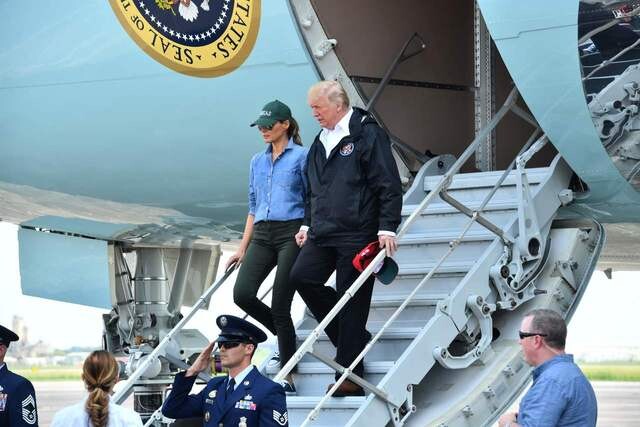hankyoreh
Links to other country sites 다른 나라 사이트 링크
[Editorial] Trump’s threat to withdraw from KORUS FTA is extremely regrettable

On Sept. 2, US President Donald Trump said the US is considering the option of withdrawing from its free trade agreement with South Korea (called the KORUS FTA) and that this process could begin as early as this week. These unilateral remarks are extremely regrettable since they were made not long after the two countries held the Joint Committee repeatedly requested by the US. The US must be aware that withdrawing from the agreement amid the international tensions over North Korea’s nuclear weapons program could have consequences that go beyond the economic arena.
It’s unclear whether Trump’s remarks will actually lead to the US’s withdrawal from the agreement or if they are merely aimed at gaining leverage in the negotiations. Neither country budged from their positions during the first special session of the FTA Joint Committee, which was held in Seoul on Sept. 22. The South Korean delegation proposed that the two sides jointly investigate, analyze, and assess the agreement’s impact, but the US didn’t even provide a timetable for responding.
If either party in the KORUS FTA notifies the other party in writing that they want to withdraw from the agreement, the agreement will come to an end in 180 days. The other party has 30 days to request “deliberations,” but the party that wants out of the agreement is free to ignore such a request. Given the current mood in the US government, Congress and the business community, the prevailing view is that Trump is unlikely to hastily withdraw from the agreement. Not only moderates such as White House National Security Advisor H. R. McMaster but also Defense Minister James Mattis are opposed to withdrawing from the agreement, the US press reported.
Following reports about Trump’s comments, the National Association of Manufacturers (NAM) sent out an emergency email to its member companies encouraging them to contact government officials and lawmakers to persuade them to halt the withdrawal from the agreement.
The US claims that its trade deficit with South Korea has doubled since the KORUS FTA took effect in 2012, but contradictory analyses have been released showing otherwise, even from organizations within the US. Most importantly, we’re not living in a dog-eat-dog, zero-sum age of protectionism like the eighteenth century. Some sectors could see gains, and others losses. On top of that, South Korea is currently facing economic losses tantamount to retaliation from China because of the deployment of the THAAD missile defense system, in line with South Korea’s alliance with the US. While remaining open to all possibilities, the South Korean government needs to emphasize these points while boldly attempting to persuade the American government to stay in the agreement.
Please direct questions or comments to [english@hani.co.kr]

Editorial・opinion
![[Column] Park Geun-hye déjà vu in Yoon Suk-yeol [Column] Park Geun-hye déjà vu in Yoon Suk-yeol](https://flexible.img.hani.co.kr/flexible/normal/500/300/imgdb/original/2024/0424/651713945113788.jpg) [Column] Park Geun-hye déjà vu in Yoon Suk-yeol
[Column] Park Geun-hye déjà vu in Yoon Suk-yeol![[Editorial] New weight of N. Korea’s nuclear threats makes dialogue all the more urgent [Editorial] New weight of N. Korea’s nuclear threats makes dialogue all the more urgent](https://flexible.img.hani.co.kr/flexible/normal/500/300/imgdb/original/2024/0424/7317139454662664.jpg) [Editorial] New weight of N. Korea’s nuclear threats makes dialogue all the more urgent
[Editorial] New weight of N. Korea’s nuclear threats makes dialogue all the more urgent- [Guest essay] The real reason Korea’s new right wants to dub Rhee a founding father
- [Column] ‘Choson’: Is it time we start referring to N. Korea in its own terms?
- [Editorial] Japan’s rewriting of history with Korea has gone too far
- [Column] The president’s questionable capacity for dialogue
- [Column] Are chaebol firms just pizza pies for families to divvy up as they please?
- [Column] Has Korea, too, crossed the Rubicon on China?
- [Correspondent’s column] In Japan’s alliance with US, echoes of its past alliances with UK
- [Editorial] Does Yoon think the Korean public is wrong?
Most viewed articles
- 1[Column] Park Geun-hye déjà vu in Yoon Suk-yeol
- 2Thursday to mark start of resignations by senior doctors amid standoff with government
- 3[Editorial] New weight of N. Korea’s nuclear threats makes dialogue all the more urgent
- 4Will NewJeans end up collateral damage in internal feud at K-pop juggernaut Hybe?
- 5Why Korea shouldn’t welcome Japan’s newly beefed up defense cooperation with US
- 6[Guest essay] The real reason Korea’s new right wants to dub Rhee a founding father
- 7Kim Jong-un expressed ‘satisfaction’ with nuclear counterstrike drill directed at South
- 8[Column] ‘Choson’: Is it time we start referring to N. Korea in its own terms?
- 9N. Korean hackers breached 10 defense contractors in South for months, police say
- 10[Column] Yoon’s first 100 days should open our eyes to pitfalls of presidential system